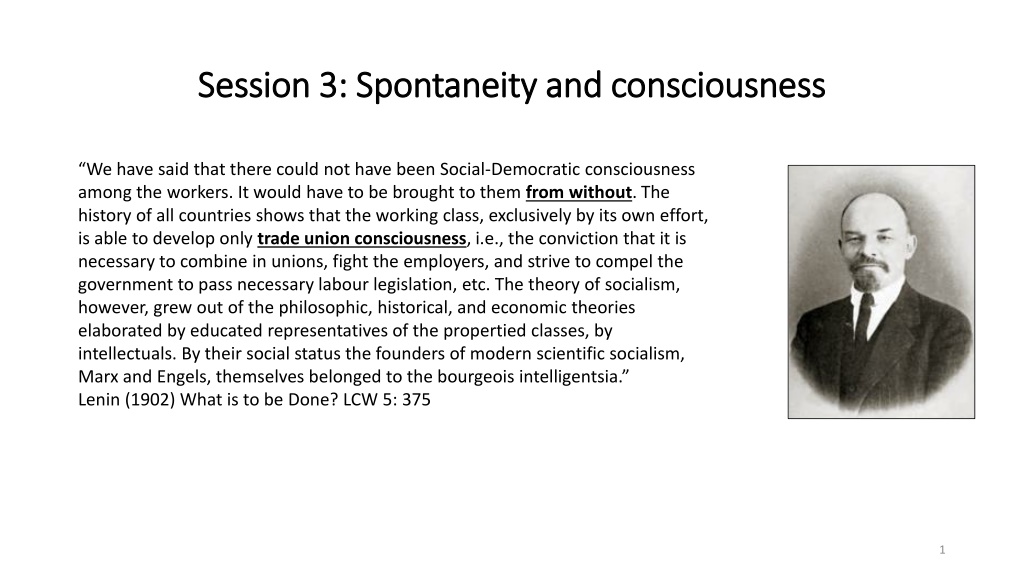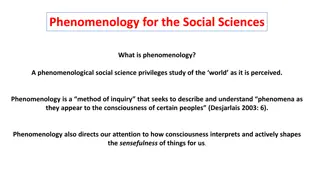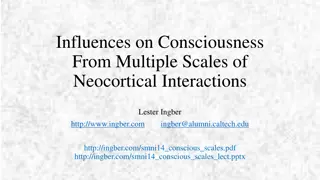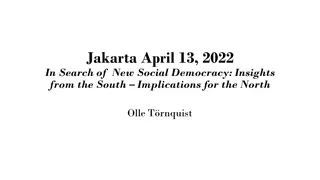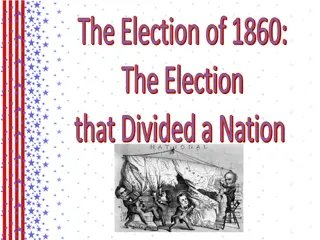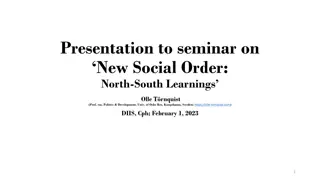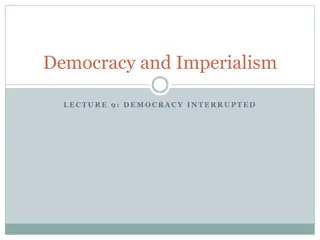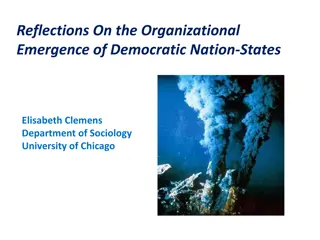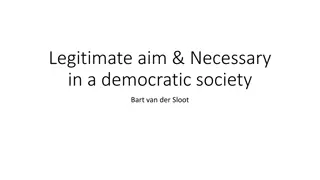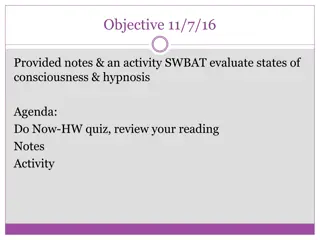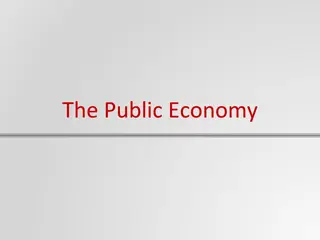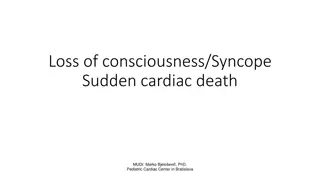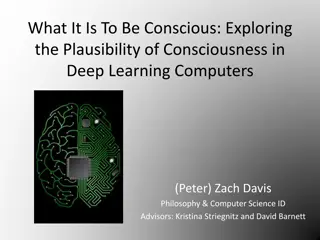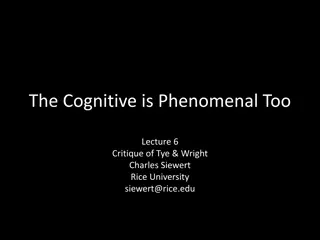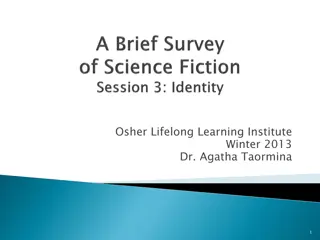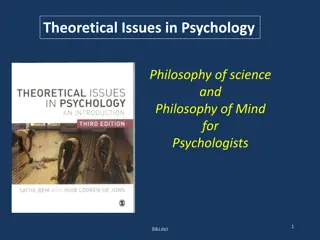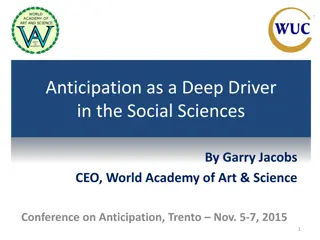The Role of Consciousness in Social-Democratic Thought
The development of socialist consciousness among the working class is discussed, emphasizing the need for outside influence to foster class and political awareness. Key figures such as Lenin and Kautsky are cited in their exploration of how consciousness is acquired and its significance in the labor movement.
Download Presentation

Please find below an Image/Link to download the presentation.
The content on the website is provided AS IS for your information and personal use only. It may not be sold, licensed, or shared on other websites without obtaining consent from the author. Download presentation by click this link. If you encounter any issues during the download, it is possible that the publisher has removed the file from their server.
E N D
Presentation Transcript
Session 3: Spontaneity and consciousness Session 3: Spontaneity and consciousness We have said that there could not have been Social-Democratic consciousness among the workers. It would have to be brought to them from without. The history of all countries shows that the working class, exclusively by its own effort, is able to develop only trade union consciousness, i.e., the conviction that it is necessary to combine in unions, fight the employers, and strive to compel the government to pass necessary labour legislation, etc. The theory of socialism, however, grew out of the philosophic, historical, and economic theories elaborated by educated representatives of the propertied classes, by intellectuals. By their social status the founders of modern scientific socialism, Marx and Engels, themselves belonged to the bourgeois intelligentsia. Lenin (1902) What is to be Done? LCW 5: 375 1
Class consciousness from without Class consciousness from without This does not mean, of course, that the workers have no part in creating such an ideology. They take part, however, not as workers, but as socialist theoreticians, as Proudhons and Weitlings; in other words, they take part only when they are able, and to the extent that they are able, more or less, to acquire the knowledge of their age and develop that knowledge. But in order that working men may succeed in this more often, every effort must be made to raise the level of the consciousness of the workers in general; it is necessary that the workers do not confine themselves to the artificially restricted limits of literature for workers but that they learn to an increasing degree to master general literature. It would be even truer to say are not confined , instead of do not confine themselves , because the workers themselves wish to read and do read all that is written for the intelligentsia... Lenin (1902) What is to be Done? LCW 5: 384 Class political consciousness can be brought to the workers only from without, that is, only from outside the economic struggle, from outside the sphere of relations between workers and employers... To bring political knowledge to the workers the Social Democrats must go among all classes of the population; they must dispatch units of their army in all directions. Lenin (1902) What is to be Done? LCW 5: 422 2
Kautsky Kautsky Many of our revisionist critics believe that Marx asserted that economic development and the class struggle create, not only the conditions for socialist production, but also, and directly, the consciousness of its necessity... Modern socialist consciousness can arise only on the basis of profound scientific knowledge. Indeed, modern economic science is as much a condition for socialist production as, say, modern technology, and the proletariat can create neither the one nor the other, no matter how much it may desire to do so; both arise out of the modern social process. The vehicle of science is not the proletariat, but the bourgeois intelligentsia: it was in the minds of individual members of this stratum that modern socialism originated, and it was they who communicated it to the more intellectually developed proletarians who, in their turn, introduce it into the proletarian class struggle where conditions allow that to be done. Thus, socialist consciousness is something introduced into the proletarian class struggle from without and not something that arose within it spontaneously. Accordingly, the old Hainfeld programme quite rightly stated that the task of Social-Democracy is to imbue the proletariat with the consciousness of its position and the consciousness of its task. There would be no need for this if consciousness arose of itself from the class struggle. Kautsky, Das Programm der Sozialdemokratie in sterreich, Neue Zeit, 1901-02, XX, I, 3: 79-80 3
Trade unionism, pure and simple Trade unionism, pure and simple There is much talk of spontaneity. But the spontaneous development of the working- class movement leads to its subordination to bourgeois ideology, to its development along the lines of the Credo programme; for the spontaneous working-class movement is trade- unionism, is Nur-Gewerkschaftlerei, and trade unionism means the ideological enslavement of the workers by the bourgeoisie. Hence, our task, the task of Social- Democracy, is to combat spontaneity, to divert the working-class movement from this spontaneous, trade-unionist striving to come under the wing of the bourgeoisie, and to bring it under the wing of revolutionary Social Democracy. Lenin (1902) What is to be Done? LCW 5: 384-85 At the AFL convention of 1890, Samuel Gompers had flatly announced his opposition to socialism and to political action by labor. "The trade unions pure and simple," Gompers declared, "are the natural organisations of the wageworkers to secure their present material and practical improvement and to achieve their final emancipation." Ray Ginger (1947) The Bending Cross: A Biography of Eugene Victor Debs. 2007: 99 4
Session 3: Spontaneity and consciousness Session 3: Spontaneity and consciousness Key ideas socialist consciousness trade union consciousness spontaneity bourgeois ideology tailism Questions 1) What does Lenin mean by the expression, socialist consciousness comes fromwithout ? 2) How does bourgeois ideology act on the labour movement? 3) Why is Lenin concerned about socialists bowing to spontaneity? 4) What does Lenin mean by tailism? 5
Session 3: Key passages Session 3: Key passages Hence, our task is to combat spontaneity, to divert the working-class movement from this spontaneous, trade-unionist striving to come under the wing of the bourgeoisie... Lenin (1902) What is to be Done? LCW 5: 384-85 The ruling ideas of each age have ever been the ideas of its ruling class. Communist Manifesto (1848) Since there can be no talk of an independent ideology formulated by the working masses themselves in the process of their movement, the only choice is either bourgeois or socialist ideology. Lenin (1902) What is to be Done? LCW 5: 384 The ideas of the ruling class are in every epoch the ruling ideas, i.e. the class which is the ruling material force of society, is at the same time its ruling intellectual force. German Ideology (1845-46) Surely it is not its function [social democracy] to drag at the tail of the movement it would be more correct to describe its tendency [Rabocheye Dyelo] not as opportunism, but as tail-ism. Lenin (1902) What is to be Done? LCW 5: 395-96 6
